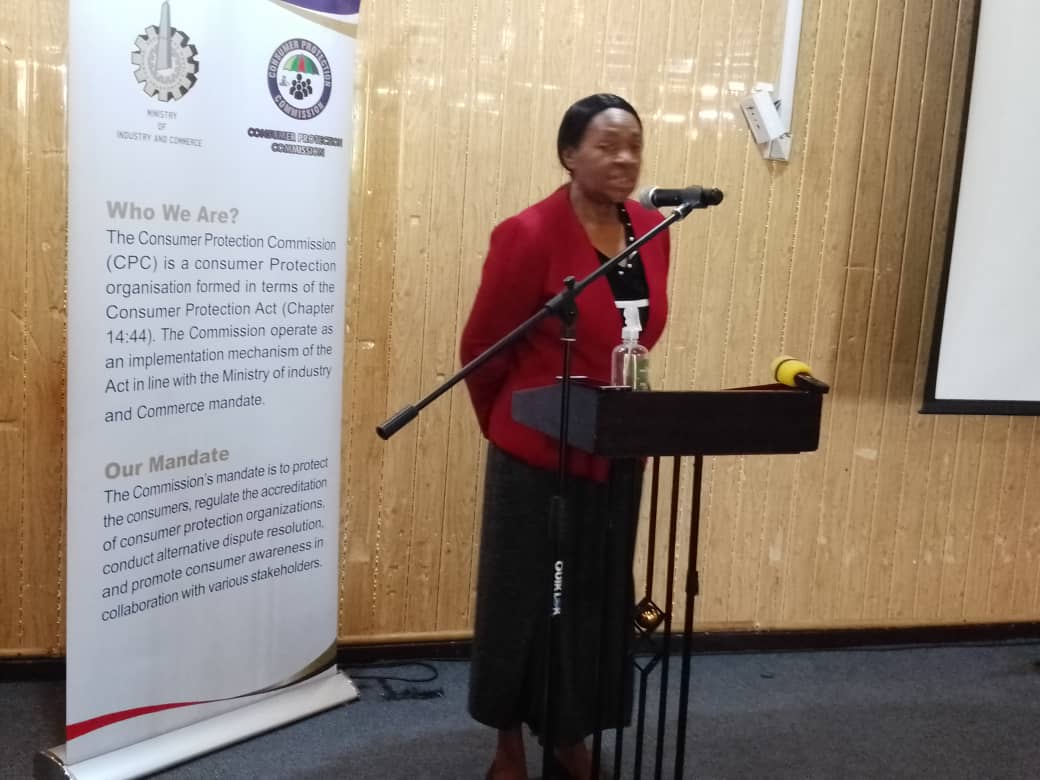|
Getting your Trinity Audio player ready...
|
Consumer protection has become central to the social and economic well-being of the Zimbabwean population, a senior government official has said.
In a speech read today at the Consumer Protection Commission stakeholders awareness workshop in Harare by Florence Angela Makombe, the Chief Director of the Industry Division in her ministry, Dr. Sekai Nzenza, the Minister of Industry and Commerce alluded to the centrality and importance of consumer protection.
The stakeholders’ awareness workshop is running under the theme, “Promoting and safeguarding consumer interests.”
“Let me take this opportunity to welcome you all to this Stakeholder Awareness Workshop, whose main objective is to promote coordination and collaboration that engenders effective Consumer Protection. This is a subject that has become central to the social and economic well-being of the Zimbabwean population,” Minister Nzenza said.
In December 2019, the Government enacted the Consumer Protection Act [Chapter 14:44] which was subsequently launched by His Excellency, the President of the Republic of Zimbabwe, Dr. E. D Mnangagwa on 28 December 2020. The Consumer Protection Act harmonizes various laws on Consumer Protection that are currently being administered in different sectors of the economy.
Minister Nzenza said the major objective of the Act is to protect consumers from unfair business practices.
“Furthermore, under the provisions of the Act, businesses that engage in unfair practices, such as fraudulent offers, false and misleading information, misleading advertisements, and failure to label products properly will be liable for prosecution.
“The Act provides for the establishment of the Consumer Protection Commission. Specifically, the Commission is mandated to protect and educate consumers on their Rights and Responsibilities, accredit consumer advocacy groups and conduct alternative dispute resolutions, among others.”
Prior to the enactment of the Consumer Protection Act in 2019, Zimbabwe was lagging behind regional and other international jurisdictions in the area of consumer protection. However, the significant domestic and global trading environmental changes have dictated that the country looks at consumer protection from a different perspective, and one that leaves no one behind.
The opening up of global markets as countries and regions seek to expand trade, has seen a significant increase in the movement of people, goods, and services across borders. With this in mind, the incidence of scams and unfair practices has become more sophisticated, hence the enactment of the Consumer Protection Act and the subsequent establishment of the Consumer Protection Commission to cater to the needs of the consumer.
She said consumer protection is at the heart of her Ministry, given the complexities of markets in present-day economies. In fact, consumer protection is one of the key result areas of Government which will lead to the attainment of Vision 2030.
Minister Nzenza said a robust consumer protection framework is well in-line with the call for Social Protection, as espoused in the National Development Strategy 1 (NDS 1).
“There is, therefore, a need to ensure that consumer rights and obligations are protected and are aligned to the new world economic environment. Such an environment is beneficial to both consumers and businesses as we aim to inculcate a culture of business and consumer rights and responsibilities.”
In that regard, she urged the business community in Zimbabwe to advance the interests of the consumers ahead of profiteering, noting that consumers have, and continue to lament over escalating prices, among other business mal-practices.
Commissioner Rose Mpofu from the Consumer Protection Commission, commenting on the consumer protection journey, said consumer protection mechanisms prior to the Consumer Protection Act of 2019 were outdated and needed an overhaul to address a number of anomalies.
The outstanding issues included discriminatory and unfair market practices; proliferation of low quality and unsafe products; lack of awareness of consumer rights; redress was limited; enforcement systems were weak; lack of consumer associations to deal with specific issues such as water, electricity, financial services; Consumer Council of Zimbabwe (CCZ) was overwhelmed by consumer issues in all sectors; uneven regulation with heavy regulation in some sectors and reliance on self-regulation
Through research and benchmarking, CCZ concluded that most countries adopted a rights-based approach to consumer protection with comprehensive laws that outlined the rights and obligations of consumers upfront. The Consumer Protection Policy Paper recommended a comprehensive consumer protection regulation with the necessary infrastructure to regulate the market for consumer goods and services.
She said Zimbabwe adheres to United Nations Guidelines on Consumer Protection which are a valuable set of principles for setting out the main characteristics of effective consumer protection legislation, enforcement institutions, and redress systems and for assisting the interested Member States in formulating and enforcing domestic Consumer Protection laws.
The guidelines are not binding in themselves but do provide a set of basic consumer protection objectives upon which governments have agreed, thereby serving as a policy framework for implementation at a national level.
The UN guidelines led to the development of consumer protection laws across the world with each country designing its law according to its needs. Whilst directed primarily at governments, some provisions of the Guidelines are also directed at businesses.
Dr. Mthokozisi Nkosi, the Chairman of the Consumer Protection Commission said a new culture centred on consumer-centricity is required for business and industry growth that is necessary for economic development in line with the Government of Zimbabwe National Development Strategy 1.
“By demanding competitive prices, improved product quality, and better service, consumers provide an impetus for innovation and enhanced performance by business. This is an important ingredient to the attainment of the 2030 upper-middle-income economy as pronounced by His Excellence President, E.D Mnangagwa,” Dr. Nkosi said.






